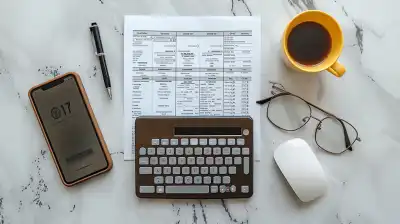01 September 2025
When it comes to managing money, most of us have the same goal: to make our hard-earned cash stretch as far as possible. But let’s be honest—sometimes it feels like our dollars are slipping away without us even noticing. That’s where Zero-Based Budgeting (ZBB) comes in. It’s a budgeting method that assigns a job to every single dollar you earn, ensuring every penny has a purpose. Sounds like a game changer, right? Well, it is.In this article, we're diving deep into the world of Zero-Based Budgeting. Whether you’re new to budgeting or just looking for a fresh approach to managing your finances, this method might be exactly what you need to take control of your money. Let’s break it down!
What is Zero-Based Budgeting?

Zero-Based Budgeting (often abbreviated as ZBB) is a method where every dollar you earn is allocated to a specific category or task until you’re left with a budget that totals zero. Yes, you read that right—zero. But don’t freak out! This doesn’t mean you’re spending every dollar and leaving your bank account empty. Instead, it means you’re giving every dollar a job, whether that’s paying bills, saving for retirement, or building an emergency fund.
How Does Zero-Based Budgeting Work?
Think of Zero-Based Budgeting like a puzzle. You start with all of your income for the month and then assign every piece (or dollar) until no pieces are left. The goal is to make sure every dollar you earn has a specific purpose.
Here’s the basic idea:
- Step 1: List your total monthly income. This includes your salary, any side hustles, dividends, or passive income.
- Step 2: Write down all your expenses. This includes everything—rent, groceries, utilities, entertainment, savings, debt payments, and even the money you plan to invest.
- Step 3: Allocate your income to cover all the expenses you’ve listed. Keep going until every dollar is accounted for, and you reach zero. Don’t forget to budget for irregular expenses, like quarterly bills or holiday shopping!
By giving each dollar a job, you guarantee that your money is working for you and not just disappearing into thin air.
Why Should You Use Zero-Based Budgeting?
With so many budgeting methods out there, you might wonder why Zero-Based Budgeting stands out. Well, let’s break it down.
1. It Forces You to Be Intentional with Your Money
When you’re using Zero-Based Budgeting, there’s no room for mindless spending. Each dollar has a designated purpose, whether it’s for a necessary expense or a goal you’re working toward. This method forces you to be more aware of your spending habits.
Instead of wondering, “Where did all my money go?” you’ll know exactly where every penny is headed.
2. It Helps You Prioritize Your Financial Goals
Whether you're saving for a new car, trying to pay off debt, or building an emergency fund, Zero-Based Budgeting allows you to prioritize. By assigning funds to your savings or debt categories first, you can make sure you're hitting your financial goals before spending on non-essential items.
3. It Can Reduce Overspending
We’ve all been guilty of impulse buying (hello, late-night Amazon orders!). But with Zero-Based Budgeting, you’re far less likely to overspend because you’ve already assigned all your dollars. If it’s not in the budget, you don’t spend it. Simple as that.
4. You Gain Full Control of Your Finances
Having a budget that aligns with your income and expenses can help you feel more in control of your financial life. You can stop worrying about bills sneaking up on you or wondering if you have enough money left for groceries. Zero-Based Budgeting gives you a clear picture of your finances.
How Zero-Based Budgeting Differs from Traditional Budgeting
You might be thinking, “This sounds a lot like traditional budgeting—what’s the difference?” While both methods help you manage your money, there are some key distinctions.
Traditional Budgeting
In a traditional budget, you estimate your monthly income and expenses and then track how much you actually spend. You might create categories for things like rent, groceries, and entertainment, but you don’t necessarily assign every dollar. Plus, traditional budgets often leave room for “wiggle room” or surplus money that’s not assigned to anything specific.
Zero-Based Budgeting
With Zero-Based Budgeting, there’s no wiggle room. You’re not just tracking your spending—you’re giving every single dollar a job before the month even starts. This method offers a more structured approach, as it requires you to plan out your spending with precision.
Example:
Let’s say you bring in $3,000 a month. With a traditional budget, you might allocate $2,500 for your bills and expenses, leaving $500 unaccounted for. In Zero-Based Budgeting, that $500 would be assigned a specific purpose, like going into an emergency fund or toward a vacation savings goal.
The Steps to Create a Zero-Based Budget
Ready to get started with Zero-Based Budgeting? Awesome. Here’s a step-by-step guide to help you create your own ZBB.
Step 1: Calculate Your Income
First things first—figure out exactly how much money you’re bringing in each month. This should include your salary, side gigs, passive income, and any other sources of income you have. Be sure to use your net income (after taxes) so you’re working with the actual amount of money you have available.
Step 2: List Your Expenses
Next, write down every single expense you have each month. This includes both fixed expenses (like rent, insurance, and car payments) and variable expenses (like groceries, entertainment, and dining out). Don’t forget to include savings, investments, and debt payments!
Step 3: Assign Every Dollar a Job
Now comes the fun part—assigning every dollar a job. Start by covering your essential expenses like rent, utilities, and groceries. Then move on to financial goals like savings and debt repayment. After that, you can allocate money for discretionary spending, like entertainment or hobbies.
Remember, the goal is to allocate all your income until you reach zero. If you find you have extra dollars left over after covering your expenses, assign those to savings or debt repayment.
Step 4: Track Your Spending
Once your Zero-Based Budget is in place, it’s time to track your spending throughout the month. You want to make sure you’re sticking to the budget you’ve created. If you overspend in one category, you may need to adjust another category to stay at zero.
Step 5: Adjust as Needed
Life happens, and sometimes your budget needs to change. That’s okay! The beauty of Zero-Based Budgeting is its flexibility. If an unexpected expense comes up, you can adjust your budget to make room for it. Just remember to reassign dollars as needed to ensure you always come back to zero.
Zero-Based Budgeting for Beginners: Tips for Success
If you’re new to Zero-Based Budgeting, it can feel a bit overwhelming at first. But don’t worry! Here are a few tips to help you succeed:
1. Start Small
You don’t have to be perfect from the get-go. Start by budgeting for just one month and see how it goes. The more you practice, the easier it becomes.
2. Use Budgeting Tools
There are plenty of apps and tools out there that can help make Zero-Based Budgeting a breeze. Apps like You Need A Budget (YNAB), EveryDollar, and Mint are great for tracking your income and expenses.
3. Be Flexible
Just because you’re budgeting down to the last dollar doesn’t mean you can’t be flexible. If life throws you a curveball, adjust your budget as needed. The key is to keep your overall budget balanced at zero.
4. Review Regularly
Your financial situation can change from month to month. Make it a habit to review your budget regularly and make adjustments as necessary. This will help you stay on top of your finances and make sure you’re always in control.
Final Thoughts: Every Dollar Counts
Zero-Based Budgeting is more than just a budgeting method—it’s a mindset. It’s about making sure every dollar you earn is working as hard as you are. By assigning every dollar a job, you’re taking control of your finances and prioritizing your goals.
Is Zero-Based Budgeting for everyone? Maybe not. But if you’re looking for a way to be more intentional with your money, reduce overspending, and work toward financial goals, it’s definitely worth giving a shot.
At the end of the day, every dollar counts. So why not make sure yours are working for you?
---
Remember, your budget should empower you, not restrict you. Zero-Based Budgeting gives you the power to take control of your financial future—one dollar at a time. Are you ready to give every dollar a job? Let’s get started!


